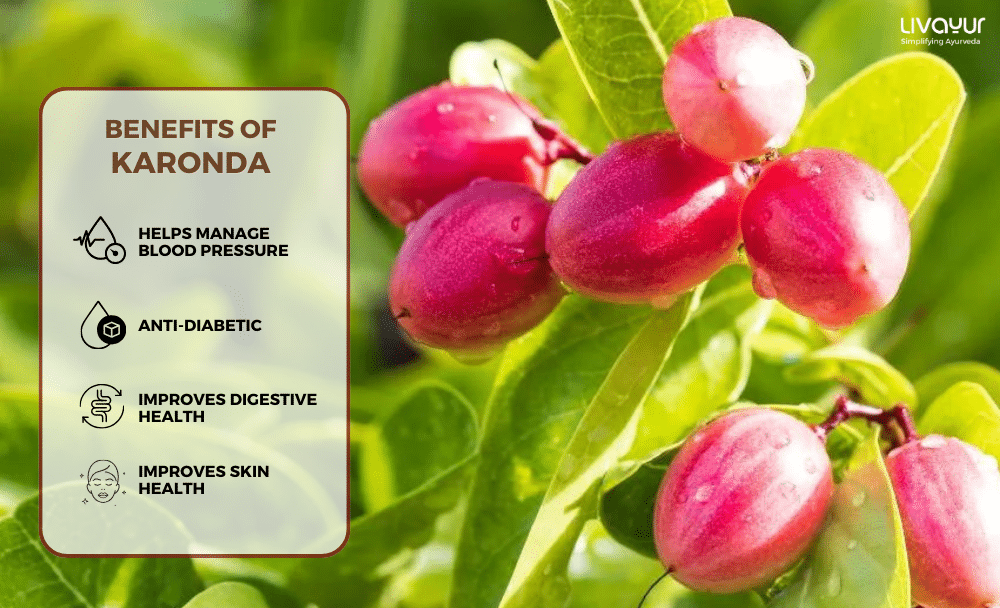
Karvanda (Carissa carandas) is a botanical gem with many benefits. Known for its therapeutic properties, karvanda has earned a well-earned place in Ayurvedic practices owing to its rich nutritional profile and diverse healing attributes. The benefits of carissa carandas are many that align with the principles of Ayurveda. This article looks at the 11 karvanda benefits for those who incorporate it into their wellness regimen.
Key facts about Karonda
- Karonda is widely distributed in the Himalayas at elevations ranging from 300 to 1800 meters.
- Dried karvanda fruit offers 364 kcal of energy per 100g.
- Karonda contains substantial amounts of vitamin C, which is crucial for the immune system.
- The benefits of karvanda also include its use as a fly repellent.
What is Karonda?
Karonda, scientifically known as Carissa carandas, is a member of the genus Carissa and the family Apocynaceae. Indigenous and prevalent throughout India, this plant has many benefits. Karonda is famous for its medicinal applications, effectively addressing diverse ailments. Widely distributed in the Himalayas at elevations ranging from 300 to 1800 meters, as well as in the Siwalik Hills and the Western Ghats, it has become an integral component of traditional healing practices.
Notably, Karonda is a rich source of iron, a crucial mineral for overall health. Regular plantations of karonda are notably commonplace in the Varanasi district of Uttar Pradesh, highlighting its cultural and agricultural significance. The fruit, characterized by its bitter and astringent taste, contains a significant amount of vitamin C. Recognized for its efficacy in combating anemia, karonda’s antiscorbutic properties further contribute to its therapeutic benefits. [1]
Nutritional value of Karonda
Here’s the nutritional value of 100 gm of fresh and dried karonda. [1]
| Nutrient | Fresh karonda | Dried karonda |
| Energy (Calorie) | 42 | 364 |
| Moisture (%) | 91 | 18.2 |
| Protein (%) | 1.1 | 2.3 |
| Fat (%) | 2.9 | 67.1 |
| Mineral (%) | – | 2.8 |
| Calcium (mg) | 2.1 | 160 |
| Phosphorus (mg) | 28 | 60 |
| Iron (mg) | – | 39 |
| Vitamin –C (mg) | 200-500 | 1.0 |
Chemical structure of karonda
Essential substances such as reducing sugar, protein, amino acids, cardinolides, terpenoids, steroids, phenolic compounds, and fatty acids may be present in karvanda. Vitamins A, riboflavin, thiamine, biotin, folic acid, and pantothenic acid are also present in Karvanda. [3] [4]
Here’s the chemical structure of the phytochemical constituents of karonda.

13 Incredible health benefits of karvanda
Here are the various karvanda benefits.
1. Rich nutritional profile
Karvanda is a remarkable source of iron, vitamin A, phosphorus, and calcium, constituting a well-rounded dietary powerhouse. Karvanda fruit also possess numerous properties such as cooling, anthelmintic, antioxidant, antipyretic, anti-inflammatory, antibacterial, anti-cancer, antiulcer, antiscorbutic. [1]
2. Anemia control
Karvanda health benefits include its high iron content making it an effective remedy for controlling anemic conditions, aiding in enhancing hemoglobin levels. Due to their high iron and vitamin C content, karvandas are excellent for strengthening immunity and treating anemia. [1]
3. Vitamin C boost
Karvanda contains substantial amounts of vitamin C, a potent antioxidant crucial for fortifying the immune system and preventing scurvy disease. The large concentrations of vitamin C, total phenolic content, and anthocyanins found in fresh karvanda berries, can help strengthen the immune system and promote overall health. [1] [6]
4. Anthelmintic properties
The mature fruit of karvanda exhibits anthelmintic effects, expelling parasitic worms from the body and promoting gastrointestinal health. The root is attributed to bitter, stomachic; antidiarrheal, vermifuge, and ant anthelmintic properties. The unripe karvanda fruit is used as an astringent.[1] [7]
5. Blood purification
Recognized for its natural blood-purifying properties, Karvanda helps eliminate impurities from the bloodstream, contributing to overall circulatory well-being. Karvanda berries are enriched with iron components. They help maintain good haemoglobin count and at the same time purify the blood by removing impurities.[1]
6. Appetite enhancement
Consumption of mature karvanda fruit proves beneficial in alleviating anorexia, providing a natural solution to enhance appetite. The fruit helps with better digestion because it contains pectin. Soluble fiber enhances the efficiency of the digestive system, which boosts appetite and reduces untimely cravings. [1]
7. Epilepsy management
Epilepsy is a chronic, non-communicable brain disorder. Recurrent seizures, which are brief episodes of uncontrollable movement involving one or more bodily parts and occasionally accompanied by loss of consciousness, are its defining feature. [9] The leaves of karvanda demonstrate efficacy in controlling epilepsy. It showcases the potential therapeutic benefits for individuals dealing with this neurological disorder. [1]
8. Gastrointestinal relief
Taking Karvanda regularly can treat bloating, indigestion, gas, and stomach difficulties. Due to its high fiber content, it is quite helpful in reducing stomach pain. Karvanda’s root helps manage various abdominal issues, including pains, dysuria, menorrhagia, and ulcers. [1]
9. Diabetes support
Regular consumption of karvanda has the potential to drastically reduce elevated blood glucose levels. The decrease of blood sugar that is associated with karvanda may be attributed to the nutrients flavonoids and phenolic compounds present in it. It presents a promising option for individuals seeking natural remedies to manage diabetes. [1] [3]
10. Medicinal properties
The karvanda fruit has astringent and antiscorbutic qualities. It is a valuable treatment for biliousness and an effective therapy for anemia in traditional medicine. Ripe karvanda fruit could have a cooling effect. Because of its acidic nature, it might help prevent mouth ulcers and sore throats. It may be possible to combat piles by taking the same amount of ground karonda fruit, leaf, and root bark once a day with water. [1] [3]
11. Enhancement of female libido
In traditional medicinal practices, karvanda fruit helps improve female libido. It highlights its broader role in promoting reproductive health. [1]
12. Potential uses of karvanda in cancer
Research indicates that extract from the karvanda fruit may have anti-cancer properties against ovarian and lung cancer. Antioxidants, flavonoids, and phenolic substances with the potential to scavenge free radicals may be present in karvanda. Consuming fruits daily may lower the risk of developing cancer, according to research conducted in a lab setting using cancer cells.[3] [4]
13. Potential uses of karvanda for skin
Research indicates that karvanda fruit may be a good source of proteins, vitamins, and antioxidants. The benefits of carissa carandas for the skin include the presence of anti-microbial and antifungal properties. Consuming karvanda fruit or fruit juice regularly may help reduce infections linked to open pores and other skin conditions. However is it advisable to consult a dermatologist and not self-medicate.[5]
Other uses of karvanda
Ayurveda mentions immense karvanda fruit benefits. Here are the diverse applications of karvanda.
1. Anti-microbial and antifungal applications
The fruits of Karvanda exhibit anti-microbial and antifungal properties. The juice helps clean infected wounds. When applied topically, it can relieve various skin problems. Due to these properties a regular intake of karvanda fruit or fruit juice may help alleviate open pores and other skin-related infections. [1]
2. Traditional remedies
Traditionally, karvanda has helped address conditions like anorexia and insanity. Karvanda leaf decoction is used to treat fever, diarrhea, and earaches. The roots have stomachic, vermifuge, itch-relieving, and insect-repelling properties. [1]
3. Decoction for ailments
A decoction made from karvanda leaves helps fight against fever, diarrhea, and earaches. The karvanda fruit juice is used to treat old wounds that have become infected since it contains antimicrobial and antifungal qualities. [1]
4. Root utilization
The roots of Karvanda serve various purposes by acting as a stomachic, vermifuge, treatment for itches, and insect repellent. They are also used to treat epilepsy, malaria, fever, dysentery and diabetes. [1]
5. Cooling drink
When cooked, the ripe fruit releases a sticky latex, but it also produces a deep red liquid that becomes clear when chilled. This can be used to make a refreshing drink during hot weather. [1]
6. Culinary uses
Ripe karvanda fruits, rich in pectin, find application in culinary endeavors like making jelly, jam, squash, syrup, tarts, and chutney. Karvanda fruits, with their tangy flavor reminiscent of cranberries, add a delightful twist to both sweet and savory dishes. Their high pectin content makes them ideal for thickening jams and jellies naturally. [1]
7. Industrial applications
Karvanda finds application in tanning and dyeing processes. Karvanda may be used to make food colourant, mainly used to add red colour to a beverage.[1]
8. Condiments
Its berry-sized fruits are used as condiments in Indian pickles and spices. [1]
9. Versatile parts
There are various karvanda fruit uses, like the roots serving as a fly repellent, leaves as fodder for the tusser silkworm, and thorny branches serving as fencing material. Additionally, the wood helps in crafting household utensils and as fuel. [1]
Side effects of Karvanda
While there are several karvanda benefits, it is essential to acknowledge the following potential karvanda fruit side effects associated with its consumption or application.
1. Allergies
Individuals with hypersensitivities or allergies to certain compounds present in karonda may experience adverse reactions. Allergic responses can be in the form of skin rashes, itching, or gastrointestinal discomfort.
Learn how you can get rid of Gastric Problems at Home
2. Digestive issues
Excessive consumption, particularly in the case of unripe fruits, may lead to digestive issues. These can be bloating or diarrhea due to its astringent properties. It is essential to exercise moderation in consumption.
3. Latex
During cooking, the latex produced by ripe karvanda fruits may cause allergic reactions in some individuals.
Precautions to know about Karonda
While there are many karvanda benefits, it is essential to observe certain precautions to ensure its safe utilization.
1. Moderation in consumption
Due to its astringent properties, excessive intake of karonda, particularly unripe fruits, may lead to digestive issues such as bloating or diarrhea. Moderation is crucial, especially for individuals with pre-existing digestive conditions.
2. Consultation during pregnancy and breastfeeding
Pregnant or breastfeeding women should consult healthcare professionals to ensure the safety of both mother and child.
3. Medical conditions and medication interactions
Individuals with pre-existing medical conditions or those taking prescribed medications should consult healthcare providers before using karonda. Precaution is essential to prevent potential interactions that could compromise ongoing treatments.
4. Individualized approach
The effects of herbal remedies can vary among individuals. Therefore, it is advisable to adopt an individualized approach, considering personal health conditions and responses.
FAQs
1. Can we eat raw karonda?
With its tart and astringent taste, you can eat it directly. However, some prefer to consume it with a sprinkle of salt or sugar to enhance its flavor.
2. Is karonda good for diabetes?
Karonda exhibits potential benefits for individuals with diabetes. It can contribute to decreasing blood sugar levels, making it a favorable addition to the diet. However, individuals with diabetes should consult healthcare professionals to determine its suitability based on their health conditions.
3. Is there vitamin C in karonda fruit?
Yes, Karonda is a rich source of vitamin C. It plays a crucial role in bolstering the immune system. Regular consumption of karonda can contribute to meeting the body’s vitamin C requirements.
4. What is the benefit of Carissa fruit?
Carissa fruit, commonly known as karonda, offers many health benefits. It is particularly rich in iron, vitamin A, phosphorus, calcium, and vitamin C. These nutritional elements contribute to its effectiveness in addressing anemia, improving immune function, and providing antioxidant support.
5. What are the benefits of karvanda fruit?
There are several karvanda fruit benefits. benefits. Its nutritional composition, including iron, vitamins, and other essential minerals, contributes to its positive impact on various aspects of health. From addressing anemia to supporting the immune system, karonda offers many health benefits.
6. How do you eat karonda fruit?
You can eat karonda by washing the fruit thoroughly and consuming it directly. Some prefer to enhance the taste by adding a sprinkle of salt or sugar. Add it to salads, jams, chutneys, or pickles.
7. What food items can be prepared using karvanda?
The answer regarding how to eat karvanda frui can be as follows. When mature karvanda fruit is boiled, the gummy latex within can be consumed as a refreshing beverage that is perfect for warm weather. You can use karvanda to make wine, tarts, puddings, jam, jelly, and squash. Chutneys made from unripe karvanda can be used as a condiment. [5]
8. What are the different names for karvanda?
The different names of karvanda fruit are Bengal currants, Black currants, Carandas-plum, Christ thorn, Karaunda, Karvand, Koromcha, etc. [5]
Conclusion
The therapeutic virtues of Karonda, rooted in the ancient wisdom of Ayurveda, highlight it as a botanical marvel. With an impeccable nutritional profile boasting high concentrations of iron, vitamin A, phosphorus, and calcium, Karonda is a suitable option for promoting holistic health. Its diverse benefits highlight the versatility of this unassuming fruit. Embracing karonda’s benefits will help you foster a journey toward enhanced vitality.
Disclaimer
This article is from a health and wellness perspective only and does not constitute medical advice. Kindly seek the help of a trained medical practitioner before initiating any treatment.
References
- Karonda: A Medicinal Plant with Immense Economic Potentials
- Carissa carandas Linn. (Karonda): An exotic minor plant fruit with immense value in nutraceutical and pharmaceutical industries
- Kamal M, Jawaid T, Khalid M. Carissa carandas Linn. (Karonda): An exotic minor plant fruit with immense value in nutraceutical and pharmaceutical industries. Asian J of Biomed and Pharma Sci. 2016;6(58):14–9.
- Kumar Rai G. Bioactive potential of karonda (Carissa carandas L.). Indian J Agric Biochem. 2021;34(1):24–32.
- Singh K, Shiv P, Singh M. Karonda: A Medicinal Plant with Immense Economic Potentials. AgriCos e-Newsletter. 2021;2(2):83–6.
- Exploring the nutritional and sensory potential of karonda fruit: Physicochemical properties, jam production, and quality evaluation. 2023 Sep 8;11(11):6931-6944. doi: 10.1002/fsn3.3619. eCollection 2023 Nov
- A Review on Carissa carandas: Traditional Use, Phytochemical Constituents, and Pharmacological properties. December 2020. Journal of Drug Delivery and Therapeutics 10(6-s):145-150
- ANTICONVULSANT AND SEDATIVE ACTIVITIES OF EXTRACTS OF CARISSA CARANDAS LEAVES. September 2018. Journal of Drug Delivery and Therapeutics 8(5):369-373
- https://www.who.int/news-room/fact-sheets/detail/epilepsy


















